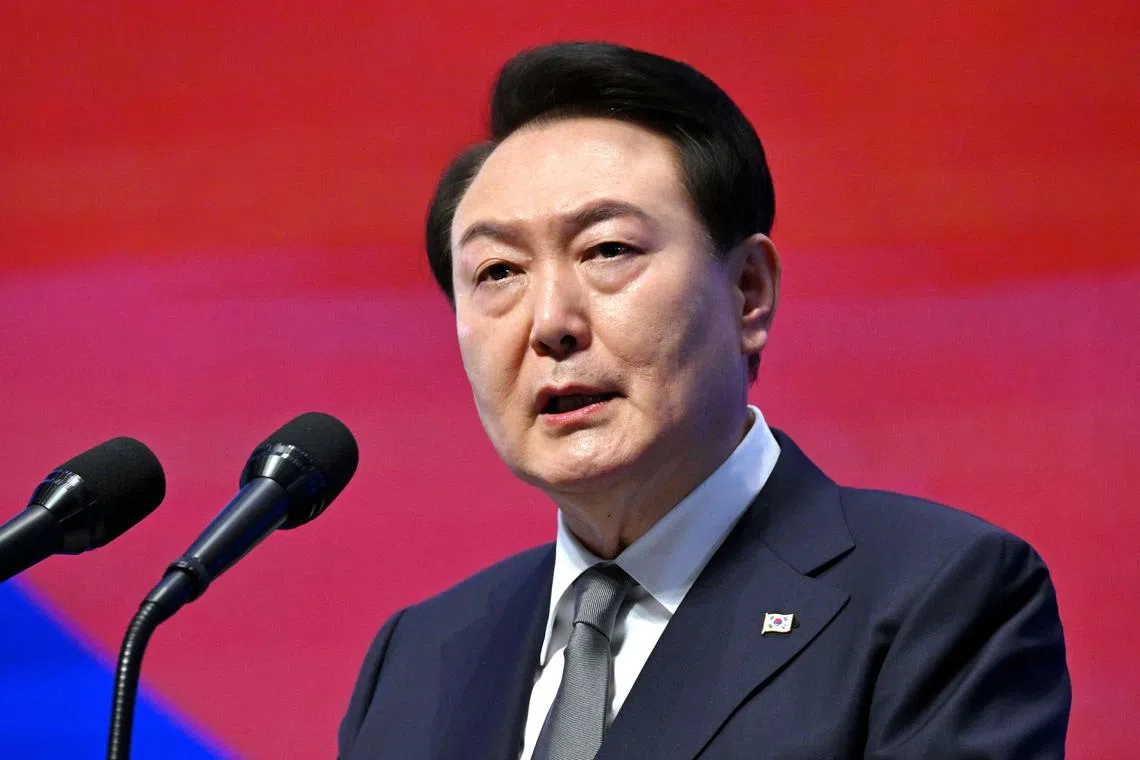South Korea investigators warn anyone blocking Yoon’s arrest ‘could be prosecuted’
Sign up now: Get insights on Asia's fast-moving developments

South Korea's Corruption Investigation Office requested the warrant after Mr Yoon Suk Yeol failed to report for questioning a third time.
PHOTO: AFP
SEOUL – South Korean investigators said on Jan 1 that they would execute an arrest warrant for President Yoon Suk Yeol over his declaration of martial law
Supporters and opponents of Mr Yoon – who was suspended from office
The Corruption Investigation Office (CIO) requested the warrant after Mr Yoon failed to report for questioning a third time. But it has been unclear whether it could execute it, as the Presidential Security Service has previously refused to comply with search warrants.
Mr Yoon has remained defiant and late on Jan 1 appeared to suggest he would refuse to hand himself over in a statement shared with supporters camped outside his residence in Seoul.
“The Republic of Korea is currently in danger due to internal and external forces threatening its sovereignty and the activities of anti-state elements,” he said in the statement, his lawyer Yoon Kab-keun confirmed to AFP.
“I vow to fight alongside you to the very end to protect this nation,” he added, saying he was watching the hundreds-strong protest on a YouTube live stream.
Mr Jo Seoung-lae, a lawmaker for the opposition Democratic Party, said in a statement that Mr Yoon’s message was “highly inappropriate”, calling him “delusional” and accusing him of trying to incite clashes.
CIO chief Oh Dong-woon said on Jan 1 that the warrant would be executed by the deadline, which is Jan 6.
“We aim for a smooth process without major disturbances, but we are also coordinating to mobilise police and personnel in preparation,” he told reporters.
He also warned that anyone trying to block the authorities from arresting Mr Yoon could themselves face prosecution.
Mr Yoon’s legal team has filed for an injunction to block the warrant and claimed on Jan 1 the arrest order was “an unlawful and invalid act”.
The suspended President’s die-hard supporters raced to Seoul to support him.
Outside the presidential compound, dozens of people – some in elaborate costume – could be seen chanting, singing and hurling vitriol at police.
As night fell, pro-Yoon protesters waved glow sticks and anti-impeachment placards.
South Korean officials have previously failed to execute arrest warrants for lawmakers – in 2000 and 2004 – due to party members and supporters blocking the police from entering for the seven-day period the warrant was valid.
Staff resign
Mr Yoon has been stripped of his presidential duties by Parliament and faces criminal charges of insurrection, which could result in life imprisonment, or even the death penalty.
On Jan 1, the majority of Mr Yoon’s remaining staff, including his chief of staff and special advisers, tendered their resignations to Acting President Choi Sang-mok – who rejected them, calling instead for unity.
“This is a time for everyone to come together for the stability of the livelihood of the people and national affairs,” Mr Choi said
The resignations were a show of discontent over Mr Choi’s decision to appoint two new judges to the Constitutional Court hearing Mr Yoon’s impeachment – meeting a key demand of the opposition, but branded an overstepping of the powers of the acting leader by Mr Yoon’s staff.
Mr Yoon declared martial law in an unannounced televised address, saying it was aimed at eliminating “anti-state elements”, but lawmakers rushed to Parliament to vote it down.
At the same time, heavily armed troops stormed the building, scaling fences, smashing windows and landing by helicopter.
The Constitutional Court will rule whether to uphold Mr Yoon’s impeachment.
The turmoil deepened late last week when Mr Yoon’s replacement, Mr Han Duck-soo, was also impeached by Parliament
Mr Choi took office Jeju Air plane crash


